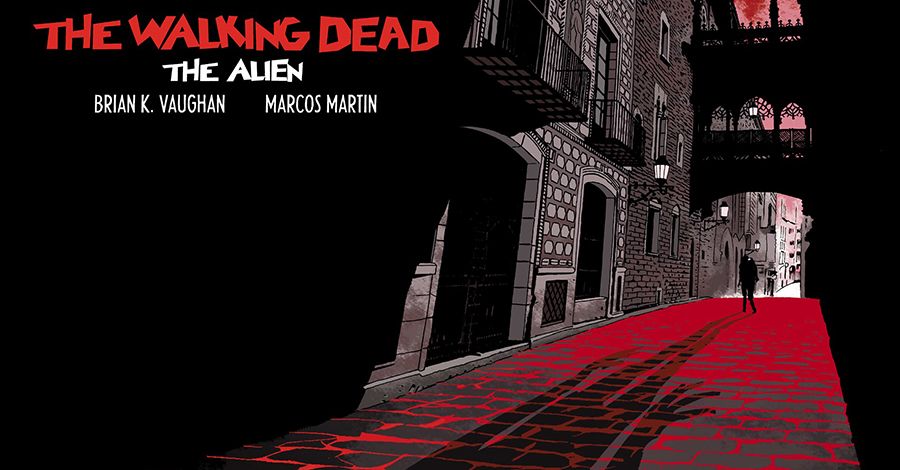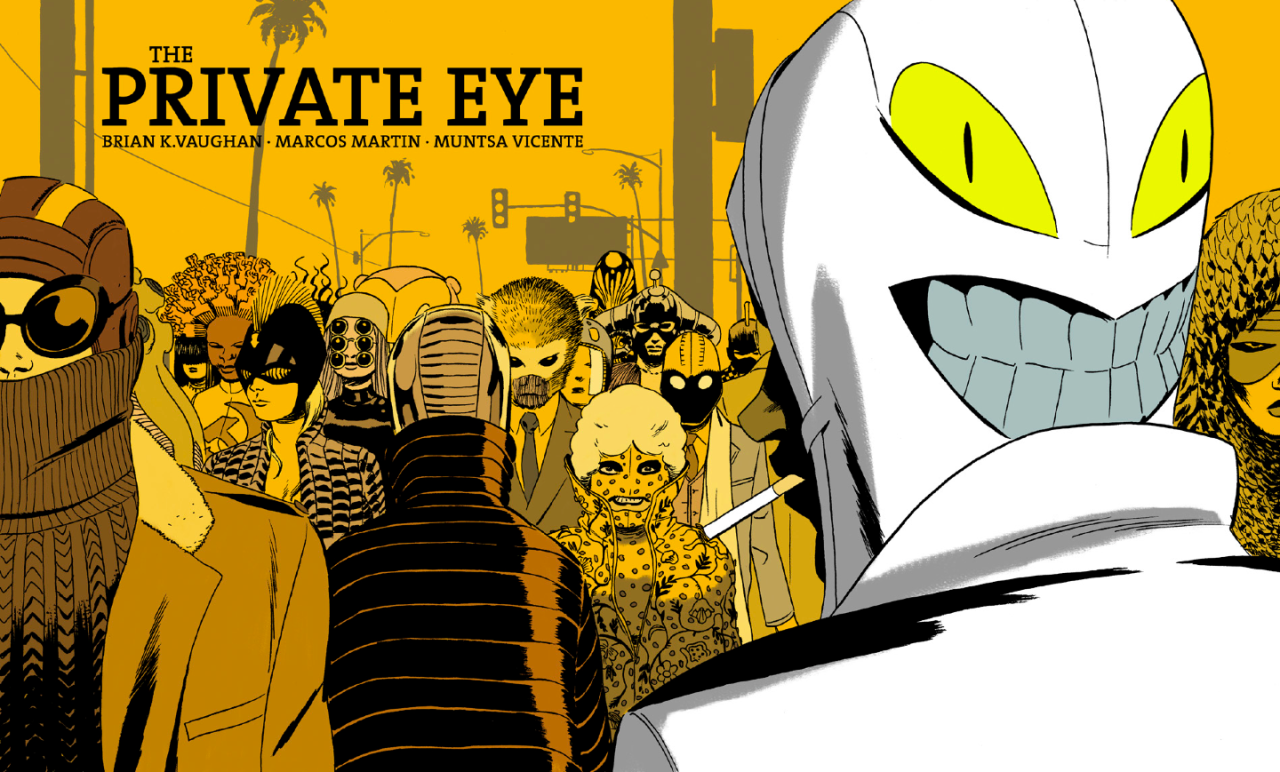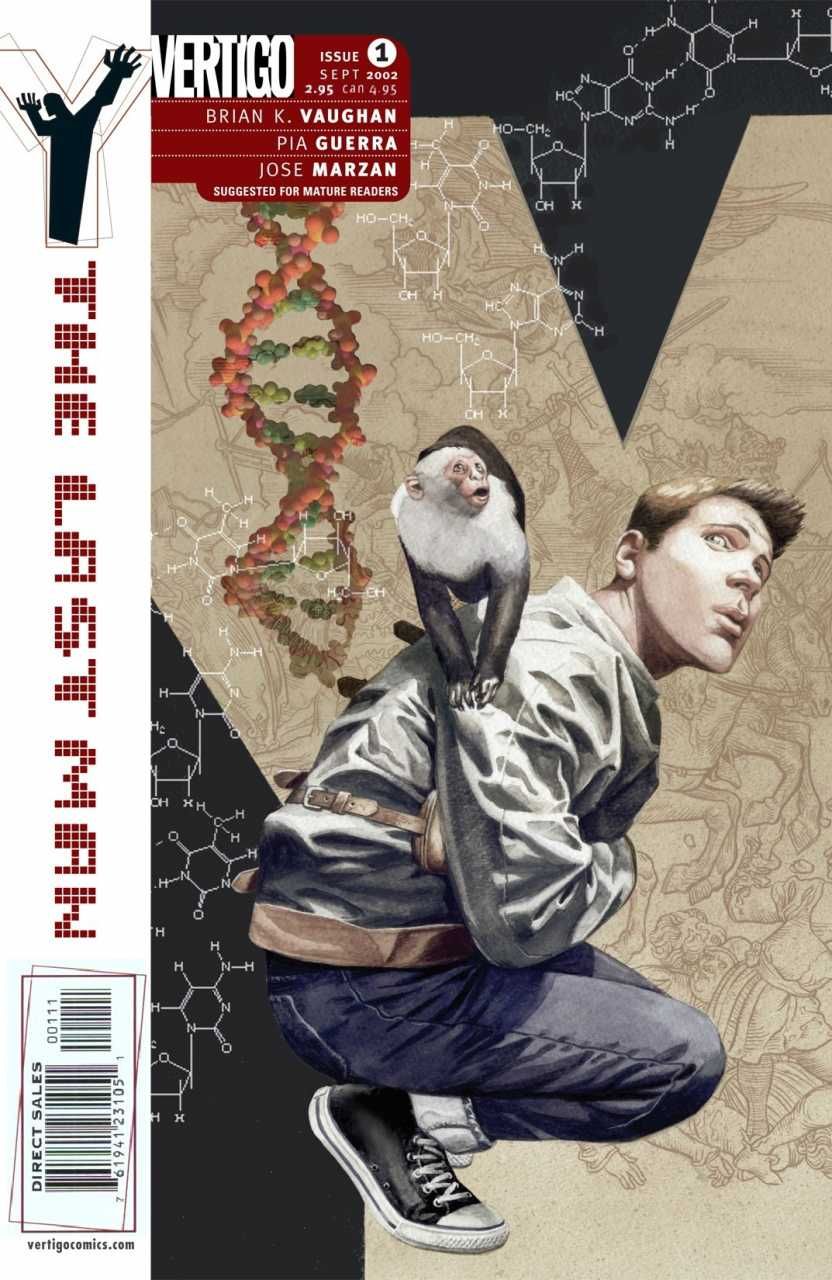If you're one of millions still reeling from the "The Walking Dead's" Season 6 cliffhanger, wait until you read "The Walking Dead: The Alien."
Written by Brian K. Vaughan and drawn by Marcos Martin, the one-shot special debuted today on their website Panel Syndicate. It's part of a deal the frequent collaborators made with Image Comics, which in exchange received the print rights to their digital comic "The Private Eye."
Brian K. Vaughan Announces "Walking Dead" Story For Panel Syndicate At Image Expo
Set well within the continuity of "The Walking Dead," created by Robert Kirkman, Tony Moore and Charlie Adlard," "The Alien" greatly expands that fictional universe by taking the story to Barcelona, Spain, thereby addressing whether the zombie apocalypse reaches beyond the United States.
A longtime fan of "The Walking Dead," Vaughan told CBR News he was thrilled when Kirkman approved their pitch. He and Martin also reveal the challenges they faced when creating the story, and what "The Walking Dead: The Alien" may mean for their DRM-free, pay-what-you-like digital comics site.
CBR News: Beyond the obvious creative expression a project like this allows, how important was this deal business-wise, for you both and Panel Syndicate?
Brian K. Vaughan: Panel Syndicate was really Marcos' brilliant idea. I thought it would fail completely. [Laughs] The idea was that we could distribute comics the way that they used to be distributed. Comics used to be a really inexpensive medium for everybody and over the years, it has become this really expensive art form for just a select few. We wanted to see if you could use digital to turn that model on its head even though we know nothing about computers. We thought we could put comics up online and let people determine how much they're worth. And these comics would be available all over the world at the same time for everyone. I did not think it was going to work, but it worked spectacularly well.
That said, it felt like we had reached the limit of what we could do, which was huge enough to sustain us to keep doing new projects at Panel Syndicate forever. But we wondered if there was a way to reach beyond those people who love Marcos' work and for people who know my work. Is there a way for Panel Syndicate to reach out beyond the normal audience? It felt like the first step was maybe doing something in print, because I recognize that there are a lot of people who never want to read digital comics. It was really [Robert] Kirkman, who begged us to bring "The Private Eye" to Image. And when he suggested, jokingly, that we could have "The Walking Dead" if Image could have "The Private Eye," it was Marcos' idea that this was a great opportunity. "The Walking Dead" is such a universal phenomenon that maybe people who never thought about reading digital comics would have to do it to read more of their beloved "The Walking Dead." It seemed like a great way to entice people that had never visited a pay-what-you-want site or never read digital comics to check it out.
Are you surprised that there haven't been too many Panel Syndicate copycats?
Vaughan: Yes, I am surprised because we know nothing about computers. Marcos and I barely understand email [laughs] and yet it was all pretty easy. It's not very hard to set up a PayPal account. It's not very hard to put up a DRM-free file. And I didn't even know what DRM meant. But when I did, it made a lot of sense. Of course, you would want a kind of file that if you bought it, you would own it completely. It was all very easy. I think a lot of people thought that Marcos and I were already established creators so it was easy, but Albert Monteys, who has come over to Panel Syndicate to do his sci-fi series "Universe!" for us, has done phenomenally well, as well. And he's not exactly a household name in the United States.
EXCLUSIVE: Monteys on Creating his "Universe!" at Panel Syndicate
It definitely requires a commitment. And a much bigger one for an artist than a writer, because Marcos draws everything for free up front. That's a real challenge. A lot of artists can't afford to do that. But I think if you save up your pennies and are willing to bet on yourself, I think it's crazy for creators not to try this.
Marcos Martin: At the beginning, I thought that we would be able to spark, I don't want to say copycats, but more people to do this kind of thing, especially more established creators. It's a great way to get your comic books directly to the readers without any interference. But as we have come along, I have come to realize that most people don't do it because it's hard work -- a lot harder than one would probably imagine. I can understand why most people would think twice before doing something like this. It's a little bit risky.
But we really wanted to reach the reader directly. And establish a relationship of co-responsibility. We're responsible for getting as good a product as we can to you guys. And, in return, the readers are responsible for making sure we can go on making comics. And I like that. I really like that relationship of co-responsibility between both reader and creator. I wish more people could do it.
Did Robert give you any restrictions in terms of what you could and couldn't do in a story set in "The Walking Dead" universe?
Vaughan: He gave us no parameters. He said, "do whatever you want to do. If you want to do something with the existing cast or if you want to do something in the past, just pitch it to me." It's been eight years since I'd done work for hire. It's always strange to write other people's characters, so I wanted to go for a big swing but I also didn't want to step on what Robert and Charlie are doing in the book. And I also wanted it to be story that if you don't want to read it, you're not going to miss out on anything, but also if it's your very first "The Walking Dead" story, you'll be able to understand it. I also wanted to do something away from the main cast. I didn't think that I'd ever seen in the comic, Robert cut away from the States.
Vaughan & Martin Debut Name-Your-Price, DRM-Free, Digital "Private Eye"
And in particular, because we have this global audience with Panel Syndicate, that was the first thing that I wanted to do. I wanted to take a look at somewhere else in the world. And with Marcos being born and raised in Barcelona, it seemed like a great opportunity to show us a scene of this universe that we haven't seen before. And secondly, I am just a big fanboy of "The Walking Dead." I've been reading it in monthly issues since I picked up the very first issue at my store a million years ago. I love it it and I knew there was some continuity things that Robert had hinted at that maybe the audience had not got an answer for. So I thought, why don't we just ask? I thought there was no way that Robert would say, yes to this story, so we sent him the pitch for "The Walking Dead: The Alien" and he read it and said he loved it, and "Full speed ahead."
Martin: This whole process was really exciting. To be a part of this worldwide phenomenon, as one of only a few people that have drawn "The Walking Dead," which is really just Tony Moore and Charlie Adlard. At the same time, and probably for the first time, because I really never felt the pressure when I was drawing Spider-Man or other established Marvel or DC characters, probably because so many different writers and artists have worked on those characters but this time, I did feel a little bit of the pressure. There was enough concern that it actually took a little bit of the enjoyment away. [Laughs]
As mentioned, there are hints as such in the ongoing series, but this story makes it abundantly clear that what's happening in terms of a zombie apocalypse in the United States in "The Walking Dead" is also happening around the world. It's a global epidemic, and that's a massive revelation for longtime readers.
Vaughan: Robert has joked in the past that because we never see other countries, maybe everything is just fine there. [Laughs] People in the U.K. are just sipping tea and enjoying life while the United States devolves into chaos. If nothing else, the first few pages of this issue will answer that question. Nope, things ain't too much happier anywhere else in the world.
Martin: I don't think that we have ever seen the plague outside of the U.S. That was a cool concept to work with. After that, it was a matter of finding a place that, even though you might think it was my idea to come to Barcelona, it was Brian's.
Now that I think of it, it was probably his desire to see me having my brains eaten by zombies. [Laughs] That's probably what he had in mind. Originally, it was going to be Madrid, but then I said, if it's going to be in Spain, we might as well go to the city that I live in because it will make it easier for me to research and find reference. I don't want to give too much of the story away, but by moving it to Barcelona, it also gave us the opportunity to end the story the way it ends.
And, again, I don't want to gloss over this, but by setting the story in Barcelona, you are really expanding the universe.
Martin: Yes and that was one of the neat twists of the story. Without really touching what's actually going on in the series, we got to give you some real important tidbits of information about "The Walking Dead" universe. These are things that fans will appreciate and I guess, even readers that don't know about "The Walking Dead" will like. There are things there for everyone to enjoy.
Marcos, you mentioned scoping Barcelona for research and reference. How important is it to ground even a fantasy/horror story like "The Walking Dead" in reality in terms of setting and environment?
Martin: I think especially when dealing with this kind of story, the more fantastical stories, if you find a way to ground it more in reality -- making it real for the reader -- makes it much more visceral, whether it's aliens or zombies. When you are dealing with real places, the story reaches the reader in a more effective way. I give a lot of the thought to the production design, to use a movie reference.
What can you tell us about your two main characters, Claudia and Jeff?
Vaughan: They are two people that we have never seen before in "The Walking Dead." We wanted to start with two original characters and make you care about them as much as you have come to care about Rick and Michonne and everyone else in the regular cast.
After 155 issues of "The Walking Dead," even the most mild-mannered characters have delivered some badass moments. We've just met Jeff, but he really isn't too badass, is he?
Vaughan: I have never written a zombie comic before, but I think my experience with post-apocalyptic books is "Y: The Last Man," and Yorick is certainly a character that I identify with because he's just totally useless [laughs] and incompetent in this circumstance. And I think that for "The Walking Dead," just because the world is so horrendous, if you survived this long, you have to be kind of a badass. And I'm not very good at writing badasses. I don't know them and I don't understand them so it's just fun to write someone who I think is maybe just a little bit more relatable to people like me. Jeff is very much a guy who is in over his head in these circumstances.
And Claudia, on the other hand, is a badass.
When we decided we were going to set the story in Barcelona, I was trying to think who would represent Barcelona, and this idea of a curator at war museum made sense. I liked the idea of a visual of a woman as a knight in shining armor going up against zombies. I'm not very well versed in zombie lore. I remember asking Robert, "Has this been done too often? Can we have someone who picks up an old suit of armor to go up against zombies?" And there was a pause before he said, "Ah, I wish I had thought of that." [Laughs] We have seen variations of people arming themselves up but I think Marcos' take on her is pretty unique.
You mentioned you haven't worked with zombies before, and I don't know that you have really done much horror either. Brian, I guess your work on "Swamp Thing" was the closest to a horror book that you've done?
I don't know if I was keeping up anyone late with my "Swamp Thing" [laughs] other than due to the quality of my writing as a young writer. There are definitely moments of horror in "Y: The Last Man" and "Saga." But I usually like to temper that with some humor or a bit of romance and everything else. And I hope this issue has got those things too, because the beauty of "The Walking Dead" is that while the first six issues are familiar to zombie stories that you've seen before, by the time you get to the 100th issue, this is not about zombies anymore. It's a story about humanity and the survival of ordinary people. That's the challenge of this issue. I didn't want to try and take Robert's voice. Marcos didn't want to draw like Charlie. We wanted it to still be us but we wanted it to feel like a "Walking Dead" comic.
"The Walking Dead" is really an underrated comic book. It's a worldwide phenomenon and everyone is obsessed with the TV show, but I just think for years and years, it's been one of the most sharply written and beautifully drawn ongoing series ever. Again, I'm a fanboy so it was just really fun to do something in that world.
Martin: Agreed. It was a lot of fun doing the story. And it was a lot of work too. It was hard. Actually, it was harder than I thought it would be. But I think it turned out pretty well.
As for drawing horror, I don't think of myself as a zombie artist. That was actually one of the things that scared me about the project. I'd never really drawn zombies before, except for one cover for Marvel at one point. All the time, I was thinking, "How am I going to do this? Am I going to draw zombies that look scary?" I actually think my zombies look kind of cute. [Laughs] They're probably not as scary as they should, be but they are my zombies and I think the story has a pulpy feeling and has lots of excitement. But again, am I good at drawing zombies? I'm not sure. That's for readers to decide but they're probably better off with Charlie.
"The Walking Dead: The Alien" is available for purchase at Panel Syndicate.




